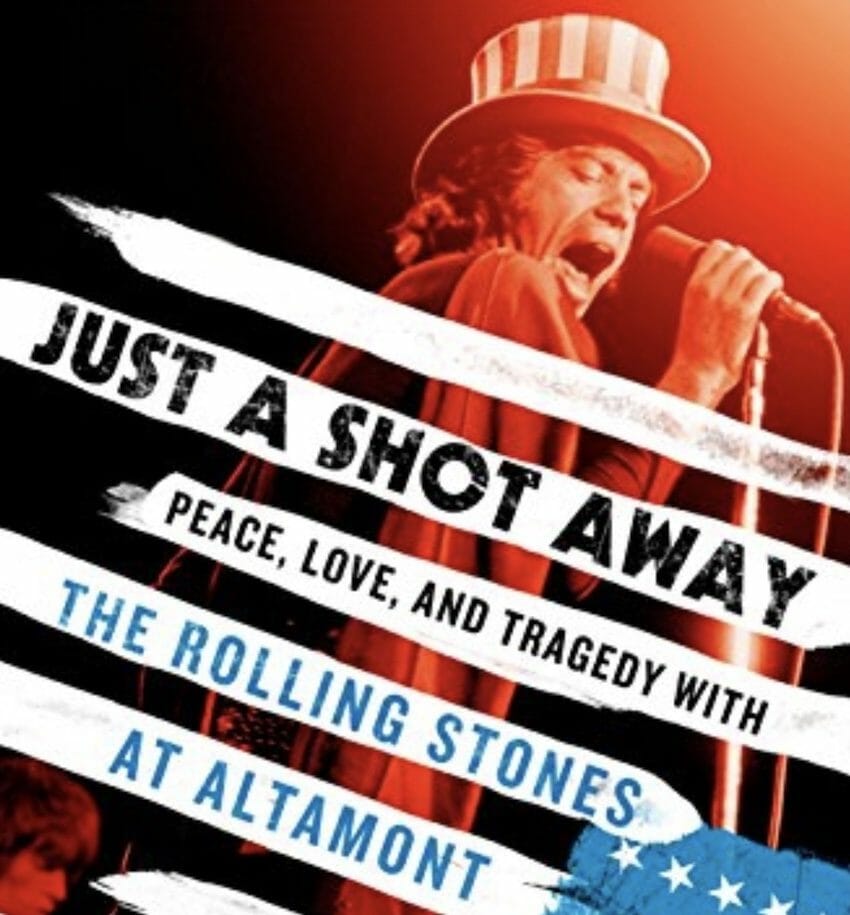#BlackLivesMatter and the Untold Story of Altamont
“Just a Shot Away: Peace, Love, and Tragedy With The Rolling Stones at Altamont”
Purchase in the Truthdig Bazaar
Purchase in the Truthdig Bazaar
“Just a Shot Away: Peace, Love, and Tragedy With The Rolling Stones at Altamont”
A book by Saul Austerlitz
In that great ballooning myth of the ’60s, Altamont ranks right up there with the anti-war demonstrations at Chicago’s Democratic Convention (1968), the Manson family murders (1969), and the National Guard killings at Kent State (1970) among the era’s most epochal events. But since it was first immortalized in the Maysles brothers’ 1970 documentary, “Gimme Shelter,” the story of that concert has emerged as its own conundrum, both as history and cliche, prophecy and sinkhole.
Altamont has produced at least one literary masterpiece in “Dance With the Devil: The Rolling Stones and Their Times” (1984) by Stanley Booth, a participant and good friend of musician Gram Parsons, whose account still repays close reading. Photographer Ethan A. Russell wrote his history of the tour with a picture book, “Let It Bleed,” in 2009; and last year brought “Altamont: The Rolling Stones, the Hells Angels, and the Inside Story of Rock’s Darkest Day,” a searing piece of reporting by longtime Bay Area scribe Joel Selvin.
Now, in “Just a Shot Away,” author Saul Austerlitz offers a fresh telling of that fateful show, reframing the narrative around Meredith Hunter—the 18-year-old black man stabbed and beaten to death by the Hells Angels, who goes unnamed in “Gimme Shelter.” However uneven, Austerlitz’s book nonetheless offers a vital perspective in the age of #BlackLivesMatter while plumbing a story that has largely been ignored: that of a young African-American man cut down in the front row of a “free” concert, planned with a breathtaking naivete, that jolted into violence.
Like the ’60s themselves, Altamont has its own twisted history. Early reports in the San Francisco Examiner and later the AP dubbed the show “Woodstock West.” One such headline even announced that “Some Were Born … Two Died,” an urban legend that medical examiners believed might well have been a ploy by promoters to cover up the concert’s violence.
It took a troupe of Rolling Stone reporters to produce a corrective in a single issue dated Jan. 21, 1970, famously edited by John Burks. Even with its own real-time inaccuracies, that account sealed the magazine’s reputation as a pillar of participatory journalism.
The following year, “Gimme Shelter” revealed how the Rolling Stones’ otherwise triumphal tour devolved into spectacular mayhem. Austerlitz explores how the film’s meta-narrative, conceived by editor Charlotte Zwerin, saved the project. “The problem, as Zwerin saw it,” Austerlitz writes, “was that the Rolling Stones needed to be confronted with the proof of their own failures.”
So the Maysles set up a camera at a London editing suite and invited the Stones to watch the footage together. In the end, only Mick Jagger and drummer Charlie Watts attended. The film culminates in a famous freeze-frame of the former making elusive eye contact with the camera.
Jagger’s knowing glance captures the film’s indictment of the concert itself, but the Stones actually funded the film and even earned royalties on it as a trailer for their live album, “Get Yer Ya-Yas Out,” released in September 1970.
Screening alongside “Woodstock” that same summer, “Gimme Shelter” captured Altamont as a metaphor for a paradise lost, and a flashpoint in a rapidly escalating culture war. Movie critic Michael Sragow called the film “a red-hot paradox: an exhilarating sober-upper,” and longtime Village Voice rock critic Robert Christgau pointed out, “Writers focus on Altamont not because it brought on the end of an era but because it provided such a complex metaphor for the way an era ended.”
To his everlasting credit, Austerlitz, writing a generation later, doesn’t claim any more vast cosmic insight than his predecessors. His portrait of the Hunter family, who settled in Berkeley during the war, reads like an anguished Toni Morrison novel: Meredith’s mother, Altha, who descended into schizophrenia, yielded child-rearing to daughter Dixie, Hunter’s senior by just eight years.
Austerlitz walks us through Hunter’s childhood all the way through the murder trial and acquittal of Alan Passaro, the man who stabbed him, in a story that rings nauseatingly familiar in the age of Trayvon Martin, Michael Brown and Eric Garner. “Two days before Altamont,” Austerlitz points out, “Chicago police had killed Black Panthers Fred Hampton and Mark Clark as they lay asleep in their beds.” (Austerlitz confirms that authorities who tested Hunter’s gun discovered it had never been discharged. In fact, the book suggests there’s reason to believe the gun was never loaded.)
Coming to terms with Altamont means coming to terms with the Rolling Stones, who escaped the scene and any semblance of responsibility via helicopter. “The Stones are making miraculous music, despite everything,” wrote Rolling Stone in its account at the time. “It’s just amazing. There could be no worse circumstance for making music, and the Stones are playing their asses off. Jagger is incredible. They all look like they’d rather be any place else. But it’s getting better and better. Driving, powerhouse waves of rhythm roll on and on.”
The Stones never made an official statement about Hunter’s death, nor did they reach out to the victim’s family, so “Gimme Shelter” stands as a testament to their negligence. They have enjoyed one of the more remarkable runs in rock history, filling stadiums well into their 70s. But as Austerlitz points out, the band has never fully come to grips with the events of that day. “Dead Flowers,” their country transition from 1971’s “Sticky Fingers,” might be the closest they ever got to a hippie farewell.
In 1993, when bassist Bill Wyman left the band, they hired Darryl Jones, a leading musician of color, who has played with them ever since. He does not appear in official band portraits.




Geen opmerkingen:
Een reactie posten